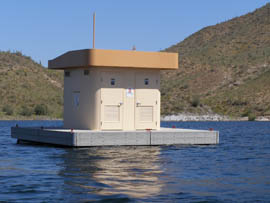Grant program aims to improve boating facilities in Arizona

 By Gerald Bourguet
By Gerald Bourguet
Cronkite News
PHOENIX – Before 1992, many boaters at Lake Pleasant had to make a tough decision when nature called: head to a restroom back at the launch ramp or, well, take care of things on the water.
And sometimes those with facilities on their boats made the bad decision to dump sewage overboard rather than use one of the limited number of pumpout systems available.
Thanks to a federal grant programs, boaters now can make use of far more convenient bathrooms built on a makeshift island as well as improved facilities for offloading sewage from boats.
“What happened in the past is people would dump their sewage overboard,” said Cris McSparen, general manager of Scorpion Bay Marina. “Environmentally, the grants have helped with new additions like the floating restrooms and more sewage pumpout systems being available to clean up a lot of our waters.”
“S.S. Port-o-Call,” as the floating bathroom is called, is one of many improvements boating facilities have made thanks to grants supplied by a federal tax on the sale of boating equipment. It’s a result of the Clean Vessel Act of 1992.
This year, the Arizona Game and Fish Department is offering $660,000 from that program and the federal Boating Infrastructure Grant to marinas, agencies and individuals owning lake property accessible to the public. Participants applying for grant money must submit their requests by April.
“This is a great example of user-pay, user-benefit,” said Tom Cadden, the department’s public information supervisor. “When people buy equipment like fishing gear or motorboat fuel, there’s a federal excise tax on it and then the government portions it out to the states for projects that will benefit fish and wildlife conservation and public recreation.”
For every dollar applicants put into making improvements on their boating facilities, the Clean Vessel Act will provide another three.
Most marinas have docks with pumpout stations that hook up tubes to boats and use a vacuum system to empty sewage tanks. Ron Christofferson, boating facilities program manager for Game and Fish, said those marinas use their portion of the $560,000 in Clean Vessel Act money for maintenance on the pumpout stations.
“Nationwide, one of the biggest complaints is that even though there are these pumpout facilities available, they aren’t being maintained,” he said. “And that’s just as unhelpful as those facilities not being there at all.”
At Lake Pleasant, McSparen said the grant money has helped with improvements that make the experience of visiting the lake cheaper and more enjoyable.
“One thing is it allows us to offer the sewage services to our customers for free because we’re not spending the full amount to buy these facilities,” he said. “If people get charged for that kind of thing, they won’t use it and will just dump their sewage overboard instead.”
The Boating Infrastructure Grant, meanwhile, provides $100,000 to make adjustments for boating facilities unable to accommodate vessels that are 26 feet or more in length.
“For example, a fuel dock might be situated in such a marina that if you come in with a 30-foot boat, you might not be able to jockey it in there to get fuel,” Christofferson said.
He said those improvements to boating facilities are a great way to give back to those boaters.
“If you’re out there boating on the lake, one way or another you’ve almost certainly contributed to these funds,” Christofferson said. “Whether you’ve gassed up your boat or bought your fishing license or your fishing pole, if someone goes and makes an improvement at the lake you’re visiting, that’s literally your money coming back to you.”














